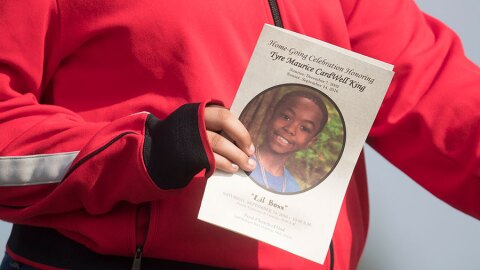Columbus city leaders and law enforcement officials gathered at the police academy auditorium on Wednesday to celebrate Columbus Police Chief Kim Jacobs’ tenure as the city’s top police officer.
Jacobs is wrapping up her last week on the job. She’s retiring, ending a pioneering career that spanned more than three decades, including seven years as chief.
An email sent by the department on Christmas Eve did not list a reason for her retirement. Jacobs took medical leave for knee surgery towards the end of 2018.
“Some of you probably want me to just say, 'Thank you, let’s go eat cake,’” Jacobs said to applause on Wednesday. “But those of you who know me do know I have something to say.”
Jacobs joined the force in 1979, only a few years after Columbus Police began training women to work as patrol officers. She broke new ground when she was appointed in 2012. She was the department’s first female chief, and also the city’s first openly gay chief.
What Jacobs Leaves Behind
Jacobs doesn’t consider those things to be the most important pieces of her legacy. She turns instead to her efforts to improve police relationships with citizens.
“It really does center on some of the training and community engagement that we’ve done. So it all goes together,” Jacobs says. “We’ve trained our officers to appreciate the conversations they can have with community members.”
She has officers sit down with community members to get to know people in a non-confrontational setting. She’s most proud of the names and faces she remembers of everyday people.
Jacobs also started sending police to conferences to learn about how they may be perceived.
“Training them where they might have biases and training them where people might be afraid of them. Through the trips to Washington D.C.,” Jacobs says. “It’s extremely important for lessons they’ve not only warmly received but have said is life-changing.”
Mayor Andrew Ginther praised Jacobs for her leadership during difficult times. He pointed to her implementation of police body cameras.
“Chief Jacobs was absolutely instrumental in one of our biggest initiatives and priorities: the successful implementation of body-worn cameras, which have proved to be an important tool in keeping the police and public safe,” Ginther says.
"We Thought She Should Be Fired"
Despite Jacobs' efforts, Black Queer & Intersectional Collective lead organizer Helen Stewart says local communities lost trust in the chief.
“Up to, over 30 people who have been killed at the hands of police, and we know that many of those people, I think 25 or 26 of those people, are people of color. Predominantly black people,” Stewart says.
Police have defended officers involved in all of the officer-involved shootings under Jacobs' tenure, and none have resulted in indictments against officers. But Stewart still believes Jacobs lost control of the police force. She points to Jacobs' request that the FBI investigate the division's vice unit.
“I think she did the best job she knew she could do,” Stewart says. “I think it’s evident in the fact that she’s retiring early, AKA resigning.”
Tynan Krakoff with the group Showing Up For Racial Justice agrees.
“We’re happy she’s retired, but we thought she should be fired,” Krakoff says.
Krakoff wishes Jacobs used her position to call for greater accountability.
“With all the police shootings, there has yet to be any indictment of police officers," Krakoff says. "And though that lands with the prosecutor’s office with Ron O’Brien, she could still call for independent investigations."
He wants to see investigations of officer-involved shootings change.
“There are other things they can do, like drug-testing police officers regularly and especially after police shootings,” Krakoff says. “Have them make a statement immediately after. They’re allowed to review the evidence before giving their statement so they don’t contradict themselves.”
Next Chief
The city is currently conducting a nationwide search for Jacobs’ replacement. If they hire someone from outside of the department, it'll be the first time in city history. In the meantime, Deputy Chief Tom Quinlan will assume the role of acting chief.
Jacobs says the next chief should listen to community concerns, but also to officers.
“I think that we need to listen to the consultant safety commission and see what direction they want to go in," Jacobs says. "But then to make sure that they’re representing the needs of the officers throughout that process.”
And Jacobs also says the next chief will need good judgment to decide which suggestions to implement.
“People that haven’t done policing often don’t understand why it has to be done a certain way,” Jacobs says. “And so I think they need to pay attention to what we’re being asked to do, but then decide if it’s actually doable in the world in which we have to operate.”






